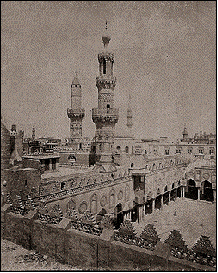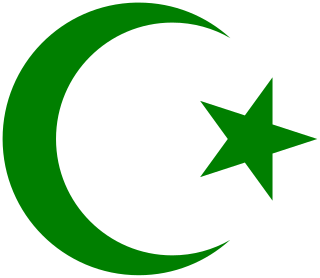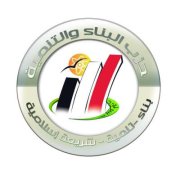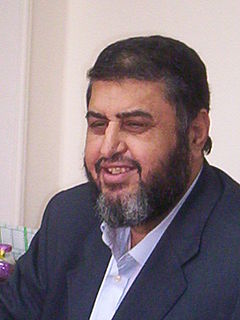
Islam in Egypt is the dominant religion with around an estimated 90% of the population. Almost the entirety of Egypt's Muslims are Sunnis, with a small minority of Shia and Ahmadi Muslims. The latter, however, are not recognized by Egypt. Islam has been recognized as the state religion since 1980. Since there has been no religious census the actual percentage of Muslims is not known: the Christians are estimated to be number between 8% to 12% according to sources cited in articles Religion in Egypt and Christianity in Egypt.

Islamic democracy is a political ideology that seeks to apply Islamic principles to public policy within a democratic framework. Islamic political theory specifies three basic features of an Islamic democracy: leaders must be elected by the people, subject to sharia, and committed to practicing "shura", which is Arabic for "consultation". The expression of Islamic democracy is different in different Muslim majority countries, as sharia interpretations vary from country to country, and the use of sharia is more comprehensive in countries in which sharia forms the basis for state laws.
The Muslim Brotherhood is an Islamic organization that was founded in Ismailia, Egypt by Hassan al-Banna in March 1928 as an Islamist religious, political, and social movement. The group spread to other Muslim countries but has its largest, or one of its largest, organizations in Egypt, where for many years it has been the largest, best-organized, and most disciplined political opposition force, despite a succession of government crackdowns in 1948, 1954, 1965 after plots, or alleged plots, of assassination and overthrow were uncovered. Following the 2011 Revolution the group was legalized, and in April 2011 it launched a civic political party called the Freedom and Justice Party (Egypt) to contest elections, including the 2012 presidential election when its candidate Mohamed Morsi became Egypt's first democratically elected president. One year later, however, following massive demonstrations, Morsi was overthrown by the military and arrested. As of 2014, the organization has been declared a terrorist group by Russia, Egypt, UAE, Saudi Arabia and is once again suffering a severe crackdown.

The Egyptian Islamic Labour Party, previously the Socialist Labour Party, is an Egyptian Islamist political party.

A presidential election was held in Egypt in two rounds, the first on 23 and 24 May 2012 and the second on 16 and 17 June. The Muslim Brotherhood declared early 18 June 2012, that its candidate, Mohamed Morsi, won Egypt's presidential election, which would be the first victory of an Islamist as head of state in the Arab world. It was the second presidential election in Egypt's history with more than one candidate, following the 2005 election, and the first presidential election after the 2011 Egyptian revolution which ousted president Hosni Mubarak, during the Arab Spring. Morsi, however, lasted little over a year before he was ousted in a military coup in July 2013.

The Yemeni Congregation for Reform, frequently called al-Islah, is a Yemeni Islamist party founded in 1990 by Abdullah ibn Husayn al-Ahmar, Ali Mohsen al-Ahmar, Abdul Majeed al-Zindani, Mohammed al-Yadumi and Yahya Rassam. The first article of Islah basic law defines it as "a popular political organization that seeks reform of all aspects of life on the basis of Islamic principles and teachings".

A parliamentary election to the People's Assembly of Egypt was held from 28 November 2011 to 11 January 2012, following the revolution that ousted President Hosni Mubarak, after which the Supreme Council of the Armed Forces (SCAF) dissolved the parliament of Egypt. However the dissolution was ruled unconstitutional and Parliament was reinstated. Originally, the elections had been scheduled to be held in September 2011, but was postponed amid concerns that established parties would gain undue advantage.

The al‑Nour Party, or "Party of The Light", is one of the political parties created in Egypt after the 2011 Egyptian Revolution. It has an ultra-conservative Islamist ideology, which believes in implementing strict Sharia law. It has been described as the political arm of the Salafi Call Society, and "by far the most prominent" of the several new Salafi parties in Egypt, which it has surpassed by virtue of its "long organizational and administrative experience" and "charismatic leaders". Its political aim is to establish a theocratic state on the lines of Wahhabism like in Saudi Arabia. Saudi Arabia was found to be the main financer of the party according to the public German television news service ARD (broadcaster).

The Building and Development Party is an Islamist political party in Egypt.

The Authenticity Party is one of the political parties created in Egypt after the 2011 Egyptian Revolution. It has an ultra-conservative Islamist Salafist ideology, which believes in implementing strict Sharia law. The party was formed by the former head of the Virtue Party, General Adel Abdel Maksoud; he left the Virtue Party after allegedly discovering a plot which changed the moderate principles of the party. The party is considering leaving the Anti-Coup Alliance.

Mohammed Khairat Saad el-Shater is an Egyptian engineer, businessman and Islamist political activist. A leading member of the Muslim Brotherhood, as the Deputy Supreme Guide, el-Shater was the initial candidate of the movement's Freedom and Justice Party during the 2012 Egyptian presidential election before being disqualified by the election commission. Previously, he was the deputy chairman of the Brotherhood.

The Strong Egypt Party is an Egyptian centrist political party founded in 2012 by former presidential candidate Abdel Moneim Aboul Fotouh.
The Anti-Coup Alliance is a coalition in Egypt formed to defeat the ouster of former president Mohamed Morsi. The coalition is made up of approximately 40 Islamist parties and groups.

The Freedom and Justice Party (FJP) is an Egyptian Islamist political party. The ex-president of the party, Mohamed Morsi, won the 2012 presidential election, and in the 2011 parliamentary election it won more seats than any other party. It is nominally independent, but has strong links to the Muslim Brotherhood of Egypt, the largest political group in Egypt. The party was banned and dissolved in 2014; however, it continues to function underground.
The Moderate Front is an alliance composed of former jihadis, ex-members of the Muslim Brotherhood and ex-al-Gama'a al-Islamiyya members. The leader of the alliance is Sabra al-Qasemy al-Wasateyya, who was a former member of Egyptian Islamic Jihad. The alliance was founded after the 30 June ouster of Mohamed Morsi and subsequent attacks on civilians. The coalition has supported Abdel Fattah el-Sisi for president in the Egyptian 2014 presidential election. The Muslim Brotherhood has been criticized by the group for its calling for protests on the anniversary of the Mohamed Mahmoud clashes; the members of the alliance want the Brotherhood to turn away from violence. One of the members of the organization, Amr Emara, is also the coordinator of the Dissident Brotherhood Youth Alliance. The leader of the Democratic Jihad Party is currently a member of the front.
The Reawakening of Egypt, also translated Egypt's Renaissance, is an electoral alliance in Egypt that was established by Abdelgelil Mostafa to contest the 2015 Egyptian parliamentary election. It had candidates in the race, but later withdrew them.











